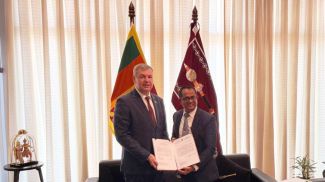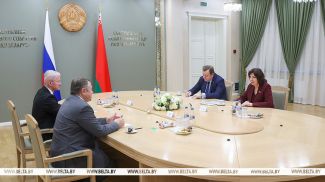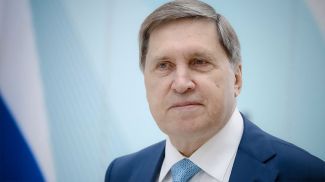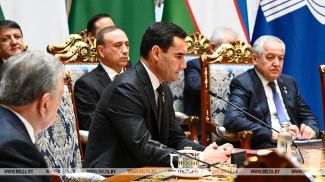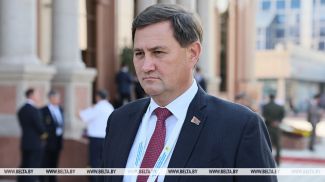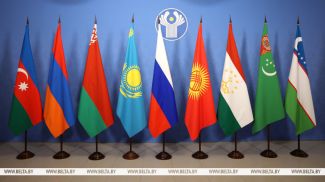
MINSK, 26 May (BelTA) - Belarus strongly respects and adheres to the spirit the Helsinki Final Act, Dean of the Faculty of International Relations at Belarusian State University Yelena Dostanko said during a roundtable discussion “The Helsinki Final Act as Political Legacy of the Victory in World War II” on 26 May, BelTA reports.
Yelena Dostanko noted that sovereign Belarus has been a full-fledged member of the OSCE since 30 January 1992. The Permanent Mission of Belarus to the OSCE operates in Vienna. The Belarusian delegation has made a significant contribution to the work of the OSCE Permanent Council and its committees, the Forum for Security Cooperation, the Joint Consultative Group, and the Open Skies Consultative Commission.
“The initiative of Belarusian President Aleksandr Lukashenko became especially significant amid rising international tensions. It was put forward in 2017 during the plenary session dedicated to the opening of the 26th Annual Session of the OSCE Parliamentary Assembly in Minsk. The Belarusian leader emphasized the need to organize a new Helsinki Process within the OSCE to return to the fundamental principles and essence of the Helsinki Final Act. He called for urgent measures to ensure comprehensive security and prevent a new armed conflict in Europe,” she said.
“This idea, later known as the Helsinki 2 initiative, was persistently and consistently promoted by both the president of Belarus and Belarusian diplomats. They emphasized the need to directly communicate between the heads of OSCE member states to discuss the current situation, which increasingly resembled the geopolitical tensions of the Cold War era. An important aspect was also the alignment of political initiatives between European countries and China, which had become a significant factor in European politics,” Yelena Dostanko stressed.
She emphasized that Belarus has made significant efforts to facilitate the practical implementation of a new dialogue following the example of the Helsinki Final Act, particularly in seeking a peaceful resolution to the conflict in Ukraine. In 2014-2021, Minsk provided a platform for meetings of the Trilateral Contact Group on Ukraine and offered extensive support to the work of the OSCE Special Monitoring Mission to Ukraine.
“Belarus has also actively participated in coordinating efforts to counter new challenges and threats faced by Europe in the 21st century. One notable example is the international conference under the auspices of the OSCE "Preventing and Combating Terrorism in the Digital Age" held in Minsk on 9-10 October 2018. The event brought together a broad range of government officials, diplomats, and cybersecurity experts,” Yelena Dostanko stated.
“Unfortunately, Belarus' position was not heeded, and military conflict has returned to Europe eight decades after the end of World War II. The words of the Belarusian president about the importance of direct dialogue between the leaders of OSCE member states to prevent new conflicts have proven to be prophetic,” she remarked.
Yelena Dostanko emphasized the need to restore trust and establish a fair order in Europe.
Yelena Dostanko noted that sovereign Belarus has been a full-fledged member of the OSCE since 30 January 1992. The Permanent Mission of Belarus to the OSCE operates in Vienna. The Belarusian delegation has made a significant contribution to the work of the OSCE Permanent Council and its committees, the Forum for Security Cooperation, the Joint Consultative Group, and the Open Skies Consultative Commission.
“The initiative of Belarusian President Aleksandr Lukashenko became especially significant amid rising international tensions. It was put forward in 2017 during the plenary session dedicated to the opening of the 26th Annual Session of the OSCE Parliamentary Assembly in Minsk. The Belarusian leader emphasized the need to organize a new Helsinki Process within the OSCE to return to the fundamental principles and essence of the Helsinki Final Act. He called for urgent measures to ensure comprehensive security and prevent a new armed conflict in Europe,” she said.
“This idea, later known as the Helsinki 2 initiative, was persistently and consistently promoted by both the president of Belarus and Belarusian diplomats. They emphasized the need to directly communicate between the heads of OSCE member states to discuss the current situation, which increasingly resembled the geopolitical tensions of the Cold War era. An important aspect was also the alignment of political initiatives between European countries and China, which had become a significant factor in European politics,” Yelena Dostanko stressed.
She emphasized that Belarus has made significant efforts to facilitate the practical implementation of a new dialogue following the example of the Helsinki Final Act, particularly in seeking a peaceful resolution to the conflict in Ukraine. In 2014-2021, Minsk provided a platform for meetings of the Trilateral Contact Group on Ukraine and offered extensive support to the work of the OSCE Special Monitoring Mission to Ukraine.
“Belarus has also actively participated in coordinating efforts to counter new challenges and threats faced by Europe in the 21st century. One notable example is the international conference under the auspices of the OSCE "Preventing and Combating Terrorism in the Digital Age" held in Minsk on 9-10 October 2018. The event brought together a broad range of government officials, diplomats, and cybersecurity experts,” Yelena Dostanko stated.
“Unfortunately, Belarus' position was not heeded, and military conflict has returned to Europe eight decades after the end of World War II. The words of the Belarusian president about the importance of direct dialogue between the leaders of OSCE member states to prevent new conflicts have proven to be prophetic,” she remarked.
Yelena Dostanko emphasized the need to restore trust and establish a fair order in Europe.




